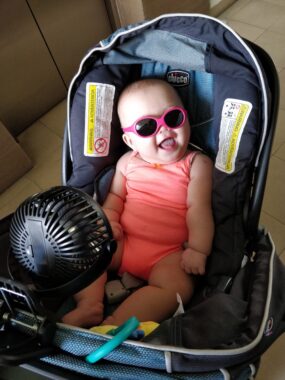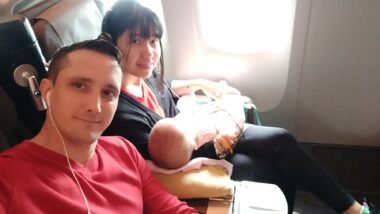Clinical trials pose many challenges for rare disease families
The obstacles begin long before enrollment, a columnist writes

Years ago, my wife, Judy, and I received the news that our daughter’s clinical trial application had been approved, allowing her to receive an experimental therapy for her rare and life-threatening disease, aromatic l-amino acid decarboxylase (AADC) deficiency. As our cheers subsided, questions began to fill the air. As it turned out, however, getting approved was the hard part. The other challenges that followed were easy in comparison.
Our road to a clinical trial began at the end of 2018, when our daughter, Rylae-Ann, was 8 months old. I’ve written about our clinical trial journey, but what came before was the true challenge.
Exploring clinical trial options
At that time, there were no approved treatments for AADC deficiency. Our family had two choices: wait for an experimental gene therapy in Poland to become available for compassionate use, or enroll in a clinical trial in Taiwan.
Approval for the therapy in Poland was completed on a case-by-case basis, and several parents, whose children were diagnosed years before our daughter, were already waiting for the opportunity to participate.
We knew about the trial in Taiwan because we’d read about some clinical trials for AADC deficiency before our daughter was officially diagnosed. However, we were unsure of this trial’s current status.
Judy and I tried our luck and submitted applications for both.

In December 2018, the Poulin family traveled to Taiwan to confirm their daughter had AADC deficiency. (Courtesy of Richard E. Poulin III)
Application process
For the compassionate use therapy, we emailed the contacts listed. I carefully crafted a message with all the relevant details, including my contact information, our doctor’s information, and our daughter’s genetic reports. I read it and reread it, and finally clicked send.
I received a reply within a couple of days, which seemed fast given the different time zones. The email was short: “Sorry, apply back when your daughter is 7 years old.”
I understand that professionals and researchers are busy, and I’m sure they see complex cases every day, so I didn’t take the message personally. However, I think the interaction serves as an important reminder to always think twice about how the recipient of the message might feel. We all have troubles and never truly know what others are going through. I was in the darkest part of my life, and were I not surrounded by love and support, that letter would’ve been crushing.
This sort of response is the reality many families face when applying to clinical trials. Over 7,000 rare diseases have been identified, and approximately 90% have no approved treatment or therapy. If a clinical trial for a potential therapy even exists, families must go through a rigorous application process before enrolling.
Fortunately, our application process was in English. If it were in another language, it would’ve been extremely difficult to complete. Judy and I have helped other families who are not native English speakers apply for clinical trials, and the process takes work for all involved.

The Poulin family traveled back to Taiwan in October 2019 so their daughter, Rylae-Ann, could undergo an experimental gene therapy. (Photo by Richard E. Poulin III)
Crossing fingers for approval
Thankfully, Rylae-Ann was approved for the clinical trial in Taiwan. The experimental gene therapy would eventually become Upstaza (eladocagene exuparvovec), which is now approved for AADC deficiency patients ages 18 months and older in Europe and the U.K. The treatment’s developer, PTC Therapeutics, is also seeking U.S. Food and Drug Administration approval.
But even after our daughter’s name was on the list, she was only a potential candidate. Clinical trials have strict conditions and requirements for participation. It seemed like we were so close, yet so far.
The criteria for the Taiwan clinical trial included citizenship, no underlying conditions, specific antibody requirements, and being fit for surgery. Rylae-Ann met all the criteria, though she was often admitted to emergency care for aspiration. However, we promised the team we’d keep her healthy. We sequestered ourselves in our house and were extremely careful during feedings.
In November 2019, Rylae-Ann underwent gene therapy, and ever since, she’s made remarkable progress. While getting approved was the hardest part of the process for us, it was relatively easy compared with what many families face. We met one person who got to the final part of the approval process, only to discover that her son wasn’t eligible for gene therapy. I can’t imagine how they felt. Nothing is easy in the rare disease community.

The Poulin family captured their first sunset at their rented apartment in Taipei, Taiwan, after they arrived to get gene therapy for their daughter. (Photo by Richard E. Poulin III)
Future awakening
Today, improved tests make the diagnostic journey faster and easier. With greater awareness about rare diseases and potential cures on the horizon, the future holds even more promise. The arduous paths families travel today will eventually become paved roads, allowing for smoother journeys.
Note: AADC News is strictly a news and information website about the disease. It does not provide medical advice, diagnosis, or treatment. This content is not intended to be a substitute for professional medical advice, diagnosis, or treatment. Always seek the advice of your physician or other qualified health provider with any questions you may have regarding a medical condition. Never disregard professional medical advice or delay in seeking it because of something you have read on this website. The opinions expressed in this column are not those of AADC News or its parent company, BioNews, and are intended to spark discussion about issues pertaining to aromatic l-amino acid decarboxylase deficiency.






Comments